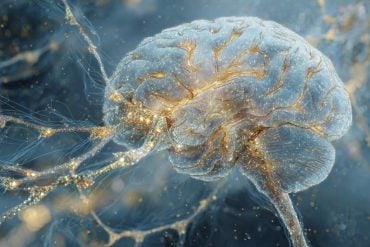Summary: Neurodegeneration sets in earlier for those with unhealthy diets and lifestyle choices.
Source: Australian National University
The average person eats many more calories than they did 50 years ago – equivalent to an extra fast-food burger meal every day – which is having devastating results for our brains and waistlines, an ANU health expert warns.
Professor Nicolas Cherbuin, the lead author of new research published in Frontiers in Neuroendocrinology, said brain health can decline much earlier in life than previously thought due, in large part, to a society that promotes unhealthy lifestyle choices.
“People are eating away at their brain with a really bad fast-food diet and little-to-no exercise,” said Professor Cherbuin from the ANU Centre for Research on Ageing, Health and Wellbeing.
“We’ve found strong evidence that people’s unhealthy eating habits and lack of exercise for sustained periods of time puts them at serious risk of developing type 2 diabetes and significant declines in brain function, such as dementia and brain shrinkage.”
The research reports about 30 per cent of the world’s adult population are either overweight or obese, and more than 10 per cent of all adults will suffer from type 2 diabetes by 2030.
“The link between type 2 diabetes and the rapid deterioration of brain function is already well established,” Professor Cherbuin said.
“But our work shows that neurodegeneration, or the loss and function of neurons, sets in much, much earlier – we’ve found a clear association between this brain deterioration and unhealthy lifestyle choices.
“The damage done is pretty much irreversible once a person reaches midlife, so we urge everyone to eat healthy and get in shape as early as possible – preferably in childhood but certainly by early adulthood.”
A standard fast-food meal of a burger, fries and soft drink is about 650 kilocalories – roughly the extra amount that people worldwide, on average, are consuming every day compared to what they were eating in the 1970s.
Professor Cherbuin said this equates to a quarter of the recommended daily food energy needs for men and just under a third for women.
“The extra amount of energy that people consume daily compared to 50 years ago means that many people have an unhealthy diet,” he said.

“People eating too much of the wrong kind of food, particularly fast food, is the other big worry. As a society, we need to stop asking, ‘do you want fries with that?’, and the mindset that comes with it. If we don’t, then expect to see more overweight and obese people suffering from serious diseases.”
Professor Cherbuin said current efforts to guard against declining brain health were often a case of “too little, too late”.
“What has become really apparent in our investigation is that advice for people to reduce their risk of brain problems, including their risk of getting dementia, is most commonly given in their 60s or later when the ‘timely prevention’ horse has already bolted,” he said.
“Many people who have dementia and other signs of cognitive dysfunction, including shrinking brains, have increased their risk throughout life by eating too much bad food and not exercising enough.”
“One of the best chances people have of avoiding preventable brain problems down the track is to eat well and exercise from a young age. The message is simple, but bringing about positive change will be a big challenge. Individuals, parents, medical professionals and governments all have an important role to play.”
The ANU research reviewed results from about 200 international studies, including The Personality & Total Health (PATH) Through Life project in the Australian Capital Territory and Queanbeyan that has followed the brain health and ageing of more than 7,000 people.
Source:
Australian National University
Will Wright – Australian National University
Image Source:
The image is in the public domain.
Original Research: Open access
“Sugar in mind: Untangling a sweet and sour relationship beyond type 2 diabetes”. Nicolas Cherbuin, Erin I. Walsh.
Frontiers in Neuroendocrinology. doi:10.1016/j.yfrne.2019.100769
Abstract
Sugar in mind: Untangling a sweet and sour relationship beyond type 2 diabetes
It is widely recognised that type 2 diabetes (T2D) represents a major disease burden but it is only recently that its role in neurodegeneration has attracted more attention. This research has shown that T2D is associated with impaired cerebral health, cognitive decline and dementia. However, the impact on the brain of progressive metabolic changes associated with the pre-clinical development of the disease is less clear. The aim of this review is to comprehensively summarise how the emergence of risk factors and co-morbid conditions linked to the development of T2D impact cerebral health. Particular attention is directed at characterising how normal but elevated blood glucose levels in individuals without T2D contribute to neurodegenerative processes, and how the main risk factors for T2D including obesity, physical activity and diet modulate these effects. Where available, evidence from the animal and human literature is contrasted, and sex differences in risk and outcomes are highlighted.







